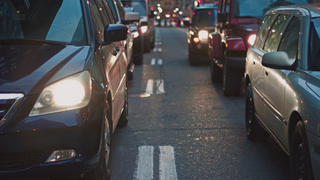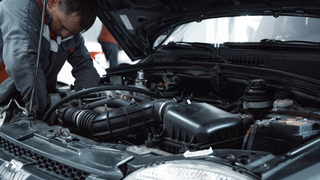It's more important than ever to do your bit to help the world's climate crisis. The UK government is under increasing pressure to bring in new measures to reduce the UK's output.
Not only can we all reduce our own emissions, but we can save ourselves money on fuel consumption, and significantly slow down the wear and tear of our cars.
The new E10 fuel was introduced recently and its use could significantly reduce the number of emissions produced to the equivalent of 350,000 cars being taken off our roads.
Do you know your car's equity position? Find out today by clicking the banner below and signing up to Car Credible for a full car finance appraisal.
By 2030, the government will ban the sale of new petrol and diesel cars, introducing the UK's roads to heavily rely on electric and hybrid vehicles.
However, until that legislation is brought in, we can all do our bit to make our cars a little bit greener and slow down the excessive emissions being produced every single day.
General driving style
The way you drive can significantly impact the number of emissions that your car is producing on the road.
If you drive aggressively by braking sharply and accelerating rapidly, you will consume more fuel and ultimately increase the number of emissions your car produces.
Coming to a steady halt by acknowledging the road ahead of you and pulling away calmly will ensure you are not guzzling fuel.
If you are able to keep your car moving, even when approaching traffic lights or a roundabout, it will improve your economy.
Stopping and starting regularly consumes more fuel than if you are consistently crawling forward by anticipating what is coming ahead.
Most modern cars will indicate on your dashboard when to go up or down a gear. It's important that you follow its guidance rather than take your own approach as your car knows the most efficient gear for you to be in.
You can consume a quarter more fuel when you go above the speed limit than you would if you stuck to it. The speed limit is there for a reason and it will not only keep you on the right side of the law but keep your fuel usage down.
Engine off in traffic
If you think you are going to be in a traffic queue for a significant period of time, then it is definitely worth switching your engine off to preserve your fuel.
However, you should only consider this if you know that you don't have low battery levels as it may be difficult to restart your car once it has been turned off.
If you are only waiting for a couple of minutes then it's probably not worth switching off your engine, but putting the handbrake on with your gear in neutral is advised.

Air conditioning
On a hot summer's day, a blast of air conditioning is exactly what you need to keep you cool while out on the road.
However, this consumes more fuel than if you weren't using it, so only consider turning it on if you really need it.
Every little helps when it comes to preserving fuel, and this is a very simple step to help stop you from doing just that.
Use your vehicle less
It may sound simple, and there have been multiple campaigns down the years to help convince us to do this, but if you don't need to use your car, or there are other means to help you get to your destination, then consider them.
If you could walk somewhere instead of hopping in the car, not only do you save a bit of fuel consumption but you also get a little bit of exercise.
If you drive to work, why not take the bus or get the train a couple of times per week? You may be spending money on public transport but you'd likely be spending the same - if not more - on filling up your car. And remember, the shorter the journey, the less economical your car is.
If you have a colleague or friend going to the same destination as you then you could consider sharing a ride. Instead of two cars going to one place, you could reduce it to just one.
It might not seem like a lot, but you'd be doing your bit to help reduce the climate issues we are currently facing.
Tyre pressure
It's important to regularly check your tyre pressure because under-inflated tyres could significantly increase your fuel consumption.
It could cause your engine to have to work harder to maintain the intensity you are asking of your vehicle, especially when stopping or turning.
This is especially important when going on long journeys as you are at greater risk of an accident or breakdown when your tyres are not at the correct pressure.

Vehicle overload
Do not store unnecessary items in your vehicle unless you absolutely need to as the heavier your car, the more fuel it will take to push it along.
It might be a bit of a pain, but your bike doesn't need to be in the boot every time you go into town, and you should leave it at home.
Regular services
You should get your car serviced at least once a year to ensure it is in good working order and fit for purpose out on the road.
A simple service will be able to highlight any potential issues with the vehicle and therefore reduce the chances of you over-consuming fuel.
Plan ahead
If you are heading on a long journey, not only should you plan your route ahead of time to avoid any anxiety of not knowing where you're going, but it will also mean you are fully prepared for how much you require of your car.
Use a sat nav to identify the quickest and the best route for you; it should be able to help you avoid bouts of traffic and incidents along your way.
Rubbish
It's very easy for your car to become a rubbish tip, particularly if you regularly undertake long journeys.
However, this doesn't mean that the road automatically becomes your dustbin and you should keep any waste in a bag in your car and dispose of it in a bin where possible.
If you can, try to separate waste from recycling products to help be an even greener driver.
There's absolutely no excuse to throw rubbish out of the window or leave it by the side of the road, just because there isn't a bin nearby.
Summary
Most of the above tips are easy to maintain and require minimal effort. Although it can be easy to forget and get back into bad habits.
You can in fact keep an eye on your fuel consumption simply by checking your dashboard every time you use your vehicle.
Most cars should be able to give you an indication of your average miles per gallon (mpg). Keep an eye on this and make a note after every journey to see how it changes.
If you can keep reminding yourself of the above, you will become an economic driver and help to decrease the emissions on our roads.
/traffic-jam-uk.jpg)


/car-tax-disc-image2.jpg)
/money-saving-tips.jpg)
/car-tax-sorn.jpg)